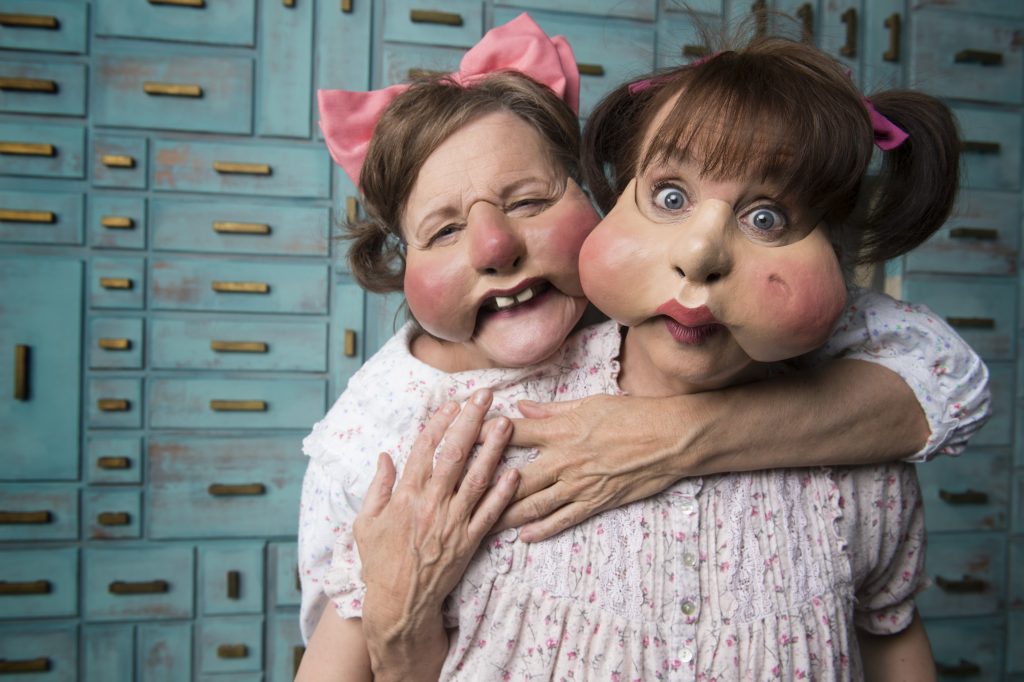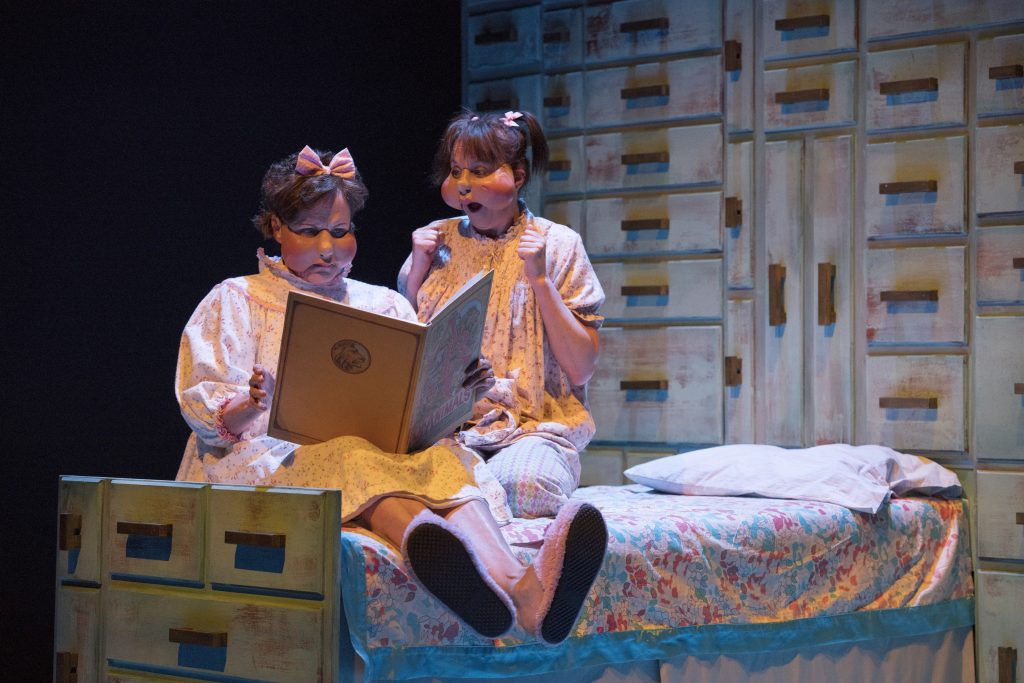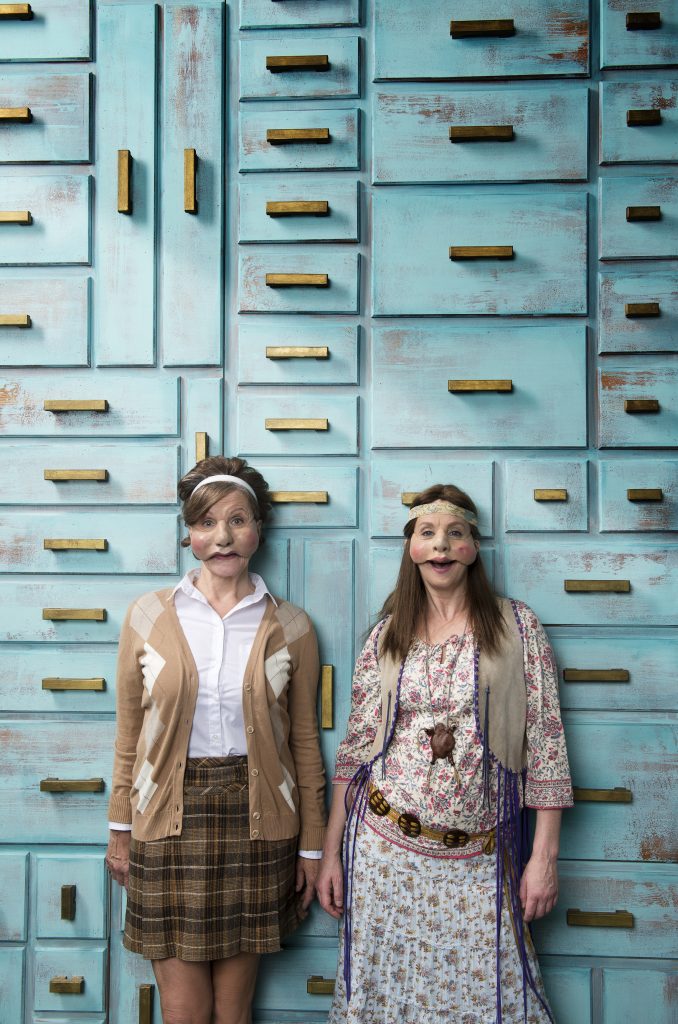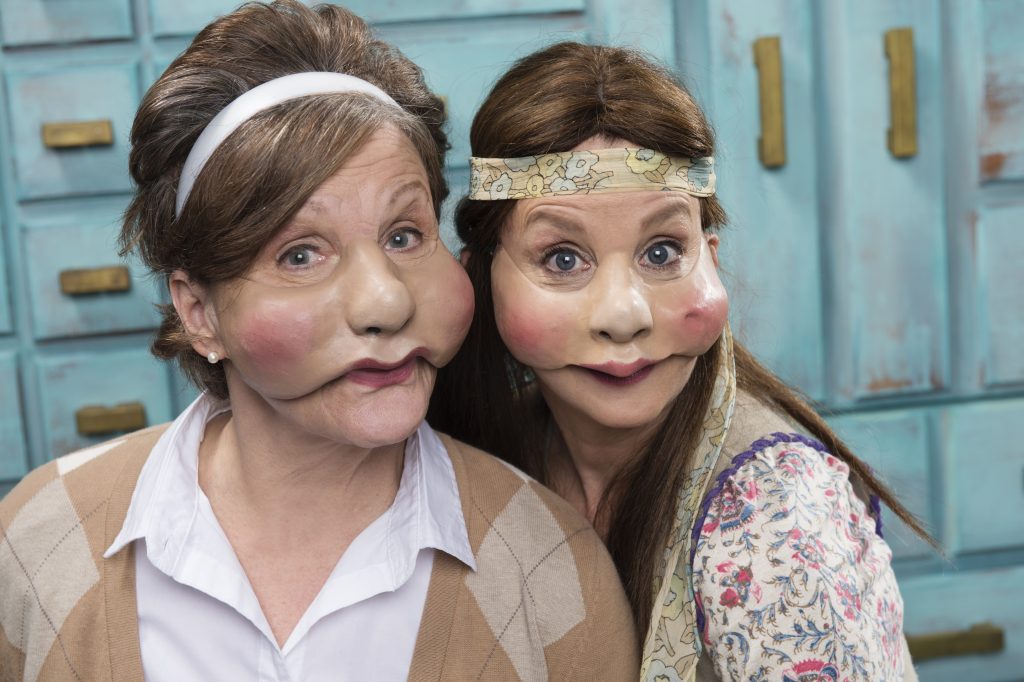
Credit: David Cooper
Arts Club Goldcorp Stage at the BMO Theatre Centre until
May 6, 2018
Tickets from $29 at artsclub.com or 604-687-1644
Posted April 22, 2018
While there’s lots of revelry between siblings there’s also rivalry and the pendulum swings back and forth over the years. In my experience, exuberant, feather-flying pillow fights alternated with griping, sniping “Mommmmm, she’s colouring in my colouring book – again.” There aren’t feathers in most pillows these days and coloring books have become a ‘thing’ for Yaletown millennials, I think. But you get the point: the relationship between siblings ebbs and flows. If you’re lucky you grow closer as you age.
Playwright/maskmaker Melody Anderson brings Louise (Lou, Lulu), played by Lois Anderson, and Elizabeth (Lizzie, Liz), portrayed by Patti Allan, to life on the Goldcorp stage. She takes them from early childhood to older adulthood with the help of half-masks: plump and rosy- cheeked to greyed and wrinkled. And she starts them off in the 50s – probably Anderson’s own growing-up era – and ends in the present. Across these years we not only see Lou and Liz mature but we see them in the context of the 50s, 60s, 70s right up to the here and now. They start off in their cotton nighties, move through skirts and shorts, a suede fringed vest (Lou) and conservative dress (Liz) to – well, I leave it to you to see where Anderson takes these two.

Credit: David Cooper
More importantly we witness changes in the culture: Liz “saves” herself before marriage to Wayne while more adventuresome Lou gets pregnant and never does marry the father. What’s really interesting is to see how the culture shapes these characters; had Lou been born first would she have become the conservative one and Liz the flower child? Would Liz not have settled for boring but steady Wayne but felt free to choose someone who made her laugh?
Under Mindy Parfitt’s direction, Me and You moves briskly through the vignettes, never lingering too long on any one period. All this action is set against Amir Okef’s set: two walls of cartoon-like drawers and cupboards into which Allan and Anderson dip to done different clothes and masks. Out of one door emerges a bed; another door opens into a bathroom which, through a scrim, we see Lou in confusion over how to use a tampon. (Funny and not too graphic.)

Credit: David Cooper
And although Me and You is about two sisters, there’s something in here for everyone who had a sibling or more: the competitiveness, the companionship, the sharing, the not-sharing. The bitching about who bears the biggest burden when aging parents need care. The reaching out when life hands out lemons.
But it’s also true that the relationship between sisters is unique: not only is there shared DNA but both have been shaped by the same environment: the family.
Patti Allan and Lois Anderson are not sisters but they sure are sisters-under-the-skin. What a great pair they make as Liz and Lou. Anderson told me after the show she doesn’t have a sister, but she does now. Or at least the playwright gives her one in this show. It’s always amazing how expressive masks can be – especially half-masks that reveal the performer’s eyes and mouth. But beyond that, the tilt or turning of the head, the downcast look, the outraged glance – it’s amazing how skilled performers like Allan and Anderson make it work.

Credit: David Cooper
Anderson writes in the program notes that she has been fascinated with how to show the aging of characters over the years within the span of an evening’s performance. Puppeteer Ronnie Burkett does it with individual puppets: same costume, aged puppet; Anderson gets the same result with different masks and performers who match the body language to the age of the character: the bubbly, bouncy physicality of childhood and the more sedate movement of older age. Having created over 3000 masks for 50 productions (including the famed Number 14), Melody Anderson is working on a book to pass along her expertise to the next generation of theatre artists.
Seventy-five minutes with no intermission, Me and You is delightful but ends on a note all sisters sooner or later must consider: the loss of that older or younger sister. It might actually be a good thing to force us to look down that road and give us a shake. Get over the rivalry; get on with the revelry. Take your sister out on the town. Go to Vegas. Go to a play. Make it this one.

